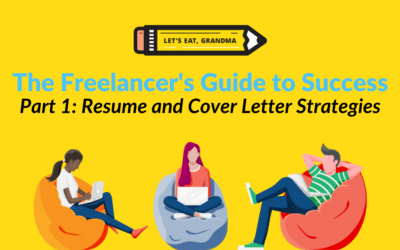Ditch that cookie-cutter cover letter template! We’ll show you both why and how to write a perfect, personalized cover letter of your own that’s sure to land you your dream job.
Updated June 2023.
I hate to break it to you, but in today’s competitive job market, sending in a cover letter template is simply not enough. Employers are looking for candidates who stand out, who show genuine interest, and who can effectively communicate their unique qualifications.
In this article, we’ll explore why you should ditch the cover letter template and instead opt for a personalized approach that will set you apart from the competition. Get ready to discover the key reasons why customizing your cover letter is a game-changer in your job search journey.
I want you to think back to your glory days: high school.
Remember what everyone would say when someone asked to copy their homework answers?
“Yeah, but just change it a little bit so the teacher doesn’t notice you copied!”
Well … isn’t sending in a pre-written cover letter template with your job application doing virtually the same thing?!
In the age of Google, it’s just too easy to search “Marketing cover letter template.”
Or, you can even go further and ask ChatGPT to write a Marketing cover letter for you.
But you and I both know that’s selling yourself short.
I get it – writing cover letters is difficult, and by no means is it cheating to find a cover letter template to help you in writing one. Using one as a guide is totally okay.
However, no matter how bad you may think your writing is, just sending in a generic cover letter template will not improve your chances of getting the job.
You’re much better off writing your own, radically personalized, letter based on the job description.
Here’s why … and how!
Why you should avoid cover letter templates
Cover letters are different from resumes
First of all, your cover letter performs a much different function than your resume.
A resume is meant for showing off how well you did at previous jobs (how broad your skill set is, what your position titles were, etc.). So, it’s appropriate to follow a pre-determined formula to maximize the efficiency of your resume, because it’s more about facts and figures – what your accomplishments say about you.
A cover letter, on the other hand, is meant to show how you did what you said you did in your resume. It’s not merely a list of accomplishments – it’s the stories behind those accomplishments.
It’s your opportunity to give personal reasons why you will thrive in this specific position. It’s your time to make a hiring manager think wow, I want to work with this person!
You have infinitely more opportunity to showcase your unique personality and passion in a cover letter. And that’s precisely why a cookie-cutter cover letter template won’t say all that needs to be said about you. ChatGPT doesn’t know your personality, specific moments that have made you proud, or challenges you’ve overcome to get where you are.
Cover letters are used for many reasons
On that note, a good cover letter tells an employer things about you as a candidate that you may not have even considered.
Employers use cover letters to see:
- How you express yourself. A well-written, error-free cover letter can prove to employers (much more than bullet points) that you can communicate well, which is huge in the workplace. It also shows that you care about the role enough that you took the time to write and check your language carefully. I know of many companies (this one included) that disqualify candidates with obvious grammatical errors and typos in their cover letters!
- Your familiarity with the company. Does your letter show that you know the company’s values, philosophy, history, and current needs? If so, you’ll be a much more attractive candidate. Employers love to see that you’re applying to their company because you’re interested in their company specifically – you’re not just firing off your resume to every job opening you see.
- If your personality is a fit. A resume can’t show whether a person is likable or enthusiastic. But a good story, positive language, and good professional etiquette on a cover letter sure as heck can.
Following a cover letter template word for word will not show the employer any of these things.
Cover letters can make you stand out more
Finally, a cover letter offers you plenty of opportunities to make yourself stand out in the mind of a hiring manager.
While your cover letter might still be passed through an ATS system, it remains much more “human” than a resume.
So, you can leverage that human appeal to distinguish yourself. No need to stress as much about keywords here. Focus more on telling memorable anecdotes about your experiences, referencing important mutual connections, or flexing knowledge about the company.
This will get you far more “memory points” with a hiring manager than trying to find a fun font, a catchy objective statement, or an unnecessary graphic for your resume.
Still not convinced? While we’re speaking of standing out, think about this:
If you’ve thought about sending in a cover letter template … how many other candidates have? With a cover letter template, you could be sending in the 100th incarnation of the same letter the company’s already received!
How to avoid the pitfalls of a cover letter template
A cover letter template is just a guide
Even the best cover letter template is too broad.
All that a cover letter template does is hit all of the necessary general points for a hypothetical candidate in your field. There’s no way it can make your application sparkle like a personalized one can.
I want to repeat here that you absolutely can use a cover letter template for basic help.
Plenty of good ones exist (like this one from career giants The Balance), but they aren’t meant to be sent in with your only changes being [INSERTING YOUR NAME HERE] and [INSERTING YOUR EXPERIENCE HERE].
A cover letter template can serve as a skeleton for your own. Use it as a tool to organize your thoughts, as well as to ensure that you have all the correct conventions for formatting, layout, greeting and closing, etc.
Write for the job, not the job title
A cover letter template is written for a job title. Your cover letter is written for the job.
Be sure you’re addressing the duties and qualifications straight from the job description, emphasizing how your experience and accomplishments relate to those qualifications, and clearly stating why you love this specific company and will succeed in this specific position.
Also, don’t be afraid to tell personal anecdotes, start with a catchy hook (especially for creative positions), or put your own voice in to make it less boring to read.
Opportunities for Bonus Points
Lastly, be sure to get those bonus points with little formalities.
- Make every effort you can to find out the hiring manager’s name and address it to her/him (and definitely not “To Whom it May Concern…”).
- End with a firm CTA, like: “I would like to discuss this position further in a formal interview.” Trust me. Be bold!
In conclusion
When it comes to sending in a cover letter, ditching the template and personalizing your message is crucial. While it may seem tempting to rely on a generic format that requires minimal effort, the benefits of customizing your cover letter far outweigh the convenience. Personalization allows you to stand out from the competition, demonstrate your genuine interest in the position, and showcase your unique qualifications and skills.
By tailoring your cover letter to the specific company and job, you create a connection with the hiring manager right from the start. It shows that you have taken the time to research the organization, understand their needs, and align your experiences with their requirements. This level of effort and attention to detail can make a remarkable impression and set you apart from candidates who have simply submitted generic templates.
Moreover, personalizing your cover letter allows you to highlight your strengths and accomplishments that are most relevant to the role. It enables you to address the specific challenges and objectives of the position, showcasing how your skills and experiences make you the ideal candidate. This level of specificity demonstrates your dedication and makes a compelling case for why you should be considered.
Additionally, personalization shows your commitment and enthusiasm for the opportunity. It conveys that you genuinely care about the position and are not just sending out mass applications. Employers are more likely to be interested in candidates who demonstrate a sincere interest in their company and have taken the time to articulate why they would be a great fit.
While it may take some extra effort and time to personalize each cover letter, the investment is worth it. Your customized approach will increase your chances of getting noticed, earning an interview, and ultimately securing the job you desire. So, leave those cover letter templates behind and make a lasting impression with a personalized message that speaks directly to the hiring manager and showcases your true potential.
Ready for more job search help?
Sign up for a free Senior Writer Resume Critique to see what’s holding you back from landing interviews. One of our top professional resume writers will give you personalized feedback on the top 3 items you can improve based on our expert practices!




